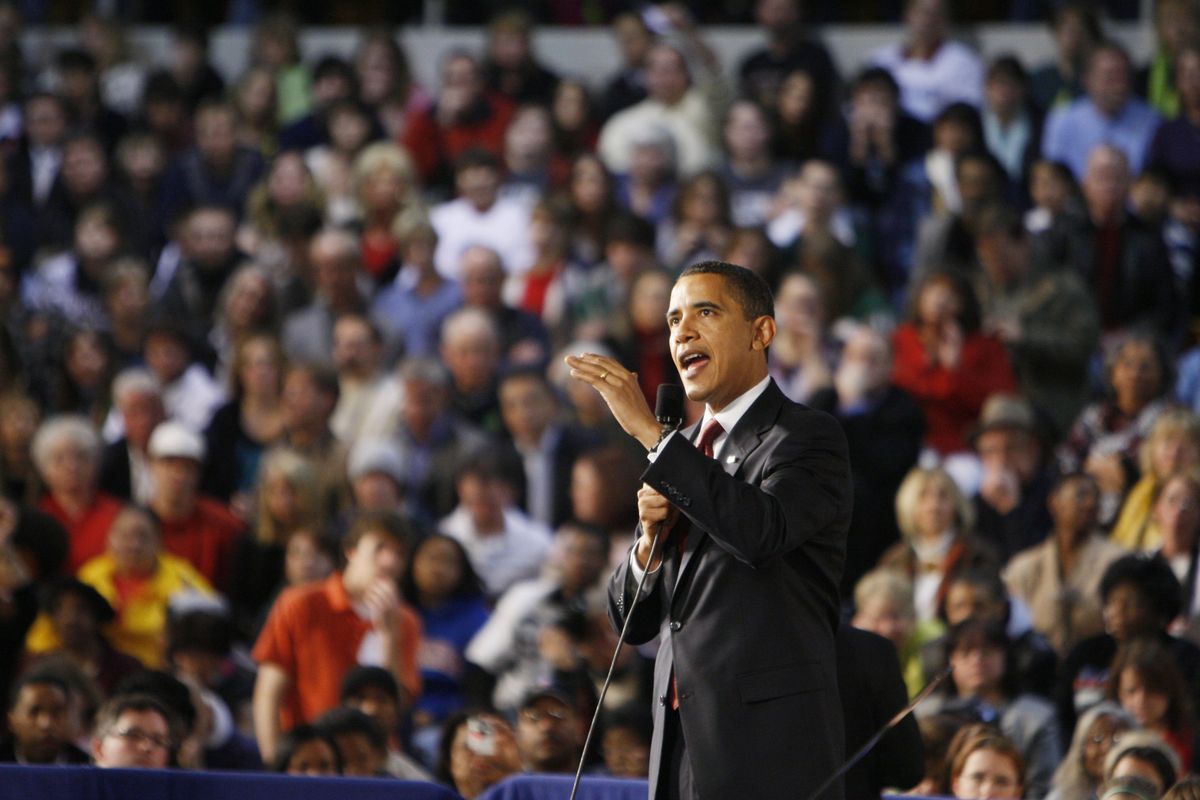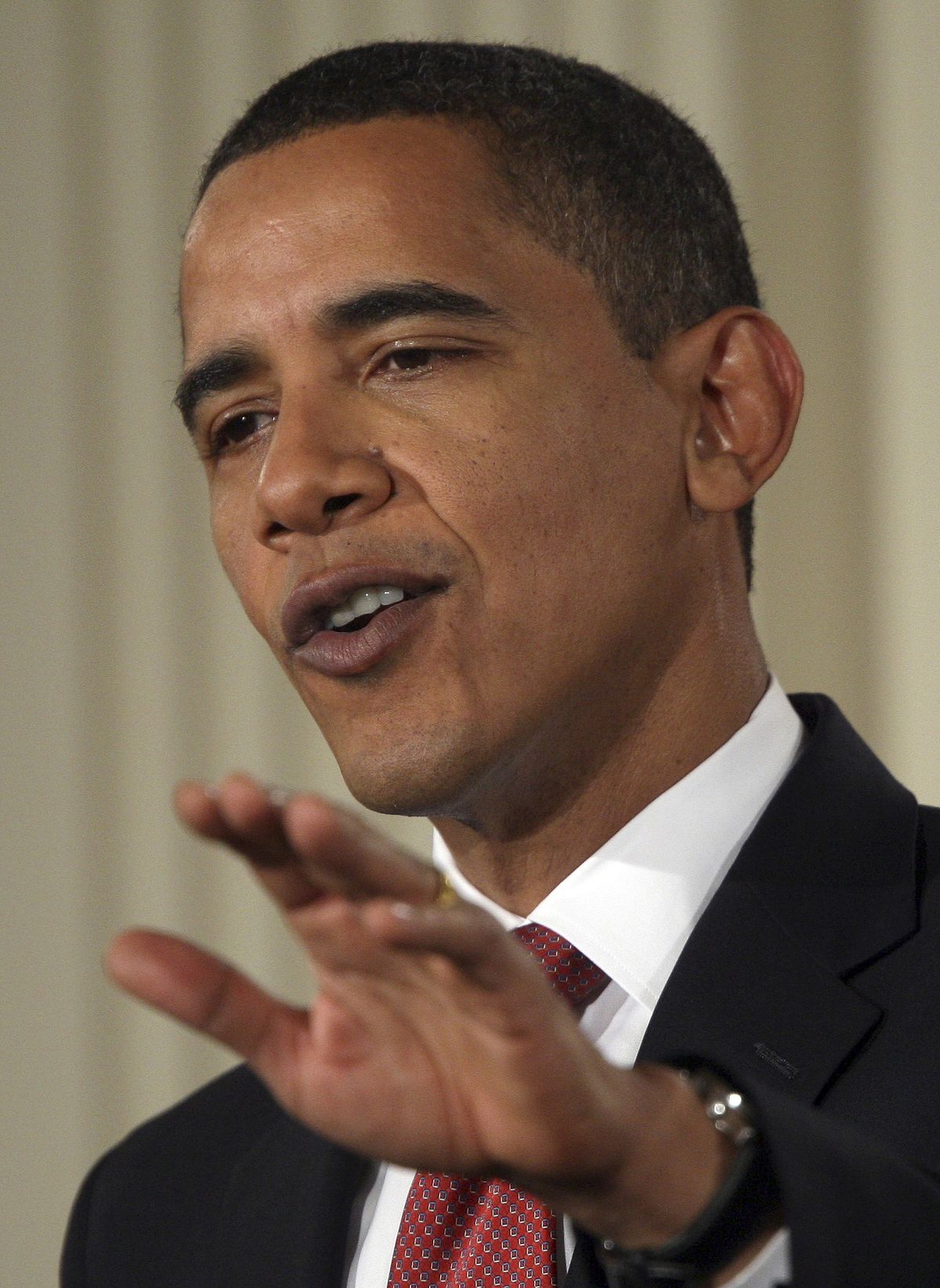Crisis needs swift action, Obama says
He’s unapologetic in stimulus push
President Barack Obama holds a town hall-style meeting about the economic stimulus package Monday at Concord Community High School in Elkhart, Ind. (Associated Press / The Spokesman-Review)
WASHINGTON – President Barack Obama declared in his first prime-time news conference Monday night that the task of saving and creating jobs is more important than cultivating the bipartisan cooperation he promised to bring to Washington and pressed his case for the massive economic stimulus plan working its way through Congress.
Warning that inaction could “turn a crisis into a catastrophe,” Obama rejected criticism from Republicans about the legislation’s effect on the federal deficit, noting that government spending and debt had ballooned on his predecessor’s watch.
Although he called for lawmakers to break out of their “ideological rigidity,” he was unapologetic as he pushed a package with a cost of more than $800 billion that has so far drawn nominal Republican support.
“I can’t afford to see Congress play the usual political games. What we have to do right now is deliver for the American people,” Obama said just hours after the legislation narrowly cleared a test vote in the Senate.
Obama repeatedly stressed the need for swift and aggressive government action – pitting his approach against those who would “do nothing” to assist a desperate public.
“At this particular moment, with the private sector so weakened by this recession, the federal government is the only entity left with the resources to jolt our economy back to life,” he said.
The president fielded 13 questions from reporters in his first wide-ranging session since taking office, touching briefly on foreign policy, his long-range agenda and sports. But the economy dominated the event. Obama, asked about the next allotment of money to aid the nation’s banks, said he was dissatisfied with the way the first $350 billion was spent.
“We didn’t get as big a bang for the buck as we should have” with the Troubled Assets Relief Program, he said. “My immediate task is making sure that the second half of that money – $350 billion – is spent properly.” That allocation process will begin today, when Treasury Secretary Timothy Geithner is slated to detail the administration’s strategy for releasing the remaining bailout money.
Obama stepped to the podium in the East Room of the White House at 5:01 p.m. Pacific time – 8:01 p.m. Eastern time – and opened with prepared remarks on the economy that set the tone for the night. Somber and focused, he alternated between the details of the legislation and discussing its broad framework, repeatedly arguing that the public would prefer even a flawed government response to the crisis over inaction. He said he thought an economic recovery could begin to set in by 2010, but warned that 2009 will continue to be a “difficult year.”
Asked whether he risked appearing to be too much of an alarmist about the economic peril facing the United States, possibly undermining public confidence in the economy, Obama said: “No, no, no, no. I think that what I’ve said is what other economists have said across the political spectrum, which is that if you delay acting on an economy of this severity, then you potentially create a negative spiral that becomes much more difficult for us to get out of.” He compared the situation with that of Japan in the 1990s, saying the Japanese, failing to act quickly enough, suffered a “lost decade.”
“This is not your ordinary run-of-the-mill recession,” Obama said.
“After many weeks of debate and discussion, the plan that ultimately emerges from Congress must be big enough and bold enough to face the size of the challenges we face right now,” he said. “We find ourselves in a rare moment where the citizens of our country and all countries are watching and waiting for us to lead. It is a responsibility that this generation did not ask for, but one that we must accept for the sake of our children and our grandchildren.”
In a brief foray into foreign policy, the president said with regard to Iran that the administration “will be looking for openings that can be created where we can start sitting across the table, face-to-face diplomatic overtures” with the Islamic republic. He said that “there’s been a lot of mistrust built up over the years, so it’s not going to happen overnight” and that “even as we engage in this direct diplomacy, we are very clear about certain deep concerns” about Iranian links to militant groups and possible pursuit of a nuclear weapon.
In stark contrast to former President George W. Bush, Obama did not say that the United States would not tolerate a nuclear-armed Iran. Instead, he all but invited Iran to signal that it, too, is interested in talks.
“Now it’s time for Iran to send some signals that it wants to act differently, as well, and recognize that, even as it has some rights as a member of the international community, with those rights come responsibilities,” he said.
Obama reverted to campaign mode Monday as part of a weeklong effort to advance a stimulus bill that has sorely tested his powers of persuasion. During a trip to Elkhart, Ind., he sought to reclaim the bully pulpit – and to put the economic package into a human context, as he took questions from citizens and described the specific real-world effects of spending nearly $1 trillion in taxpayer money.
Above all, Obama pitted himself against a hardened political establishment. “Now it’s time to act,” he told about 1,700 people gathered for the town hall meeting in Elkhart, a town with soaring unemployment. “That’s why I’m calling on Congress to pass this bill immediately. Folks here in Elkhart and all across America need help right now. They can’t afford to keep waiting for folks in Washington to get this done.”

